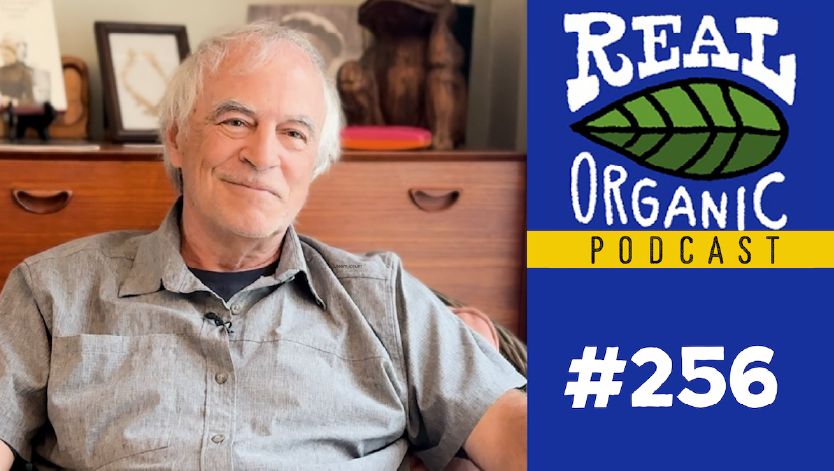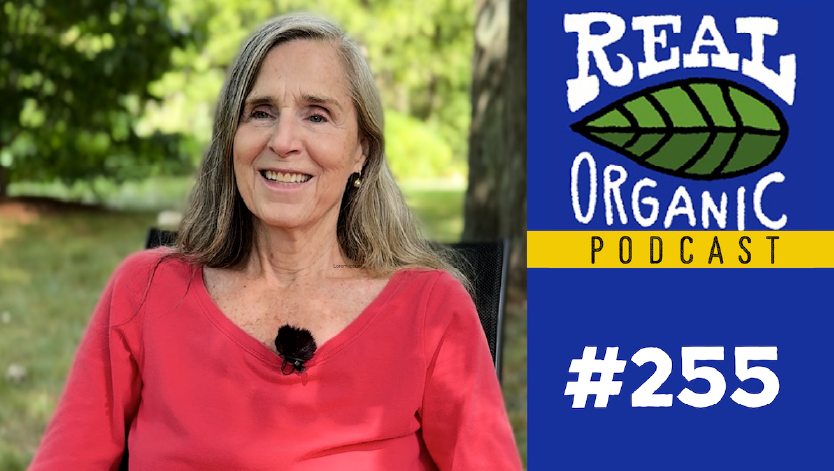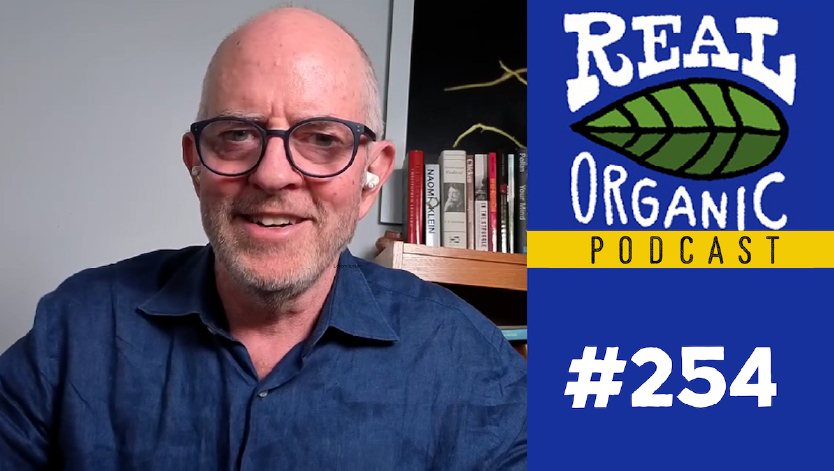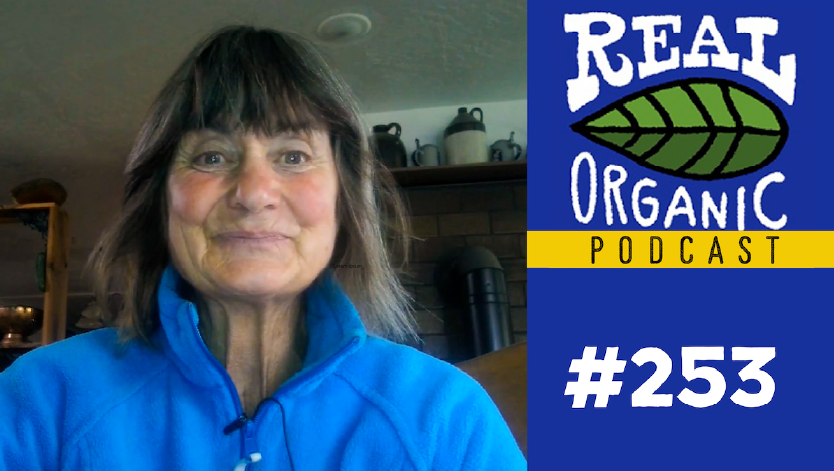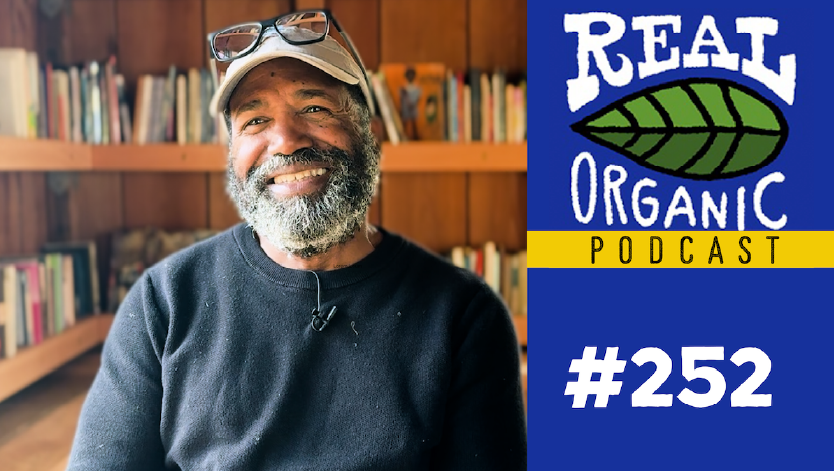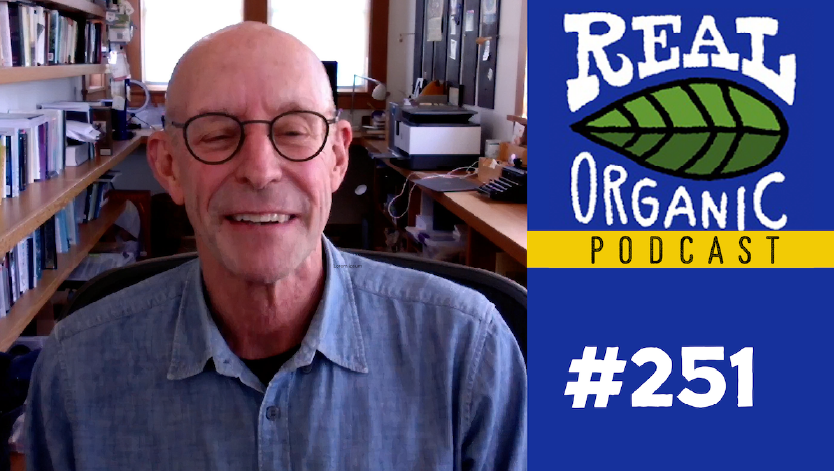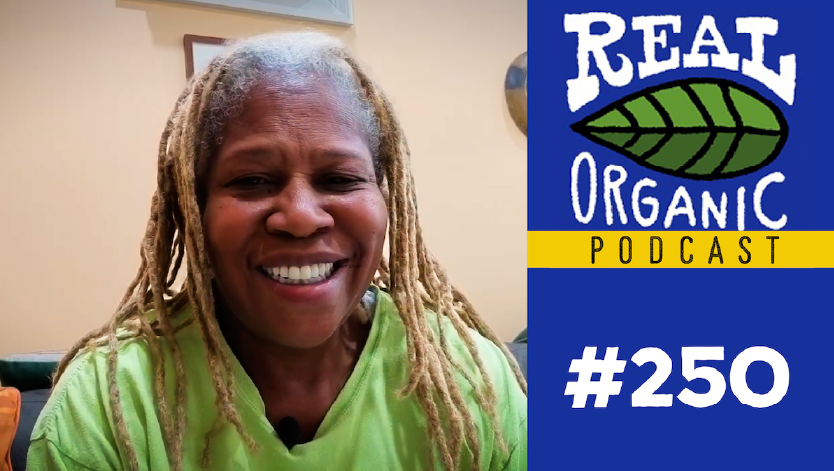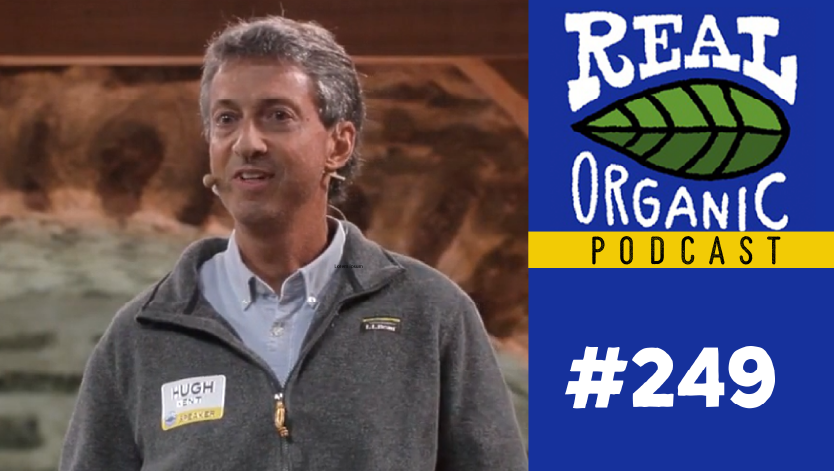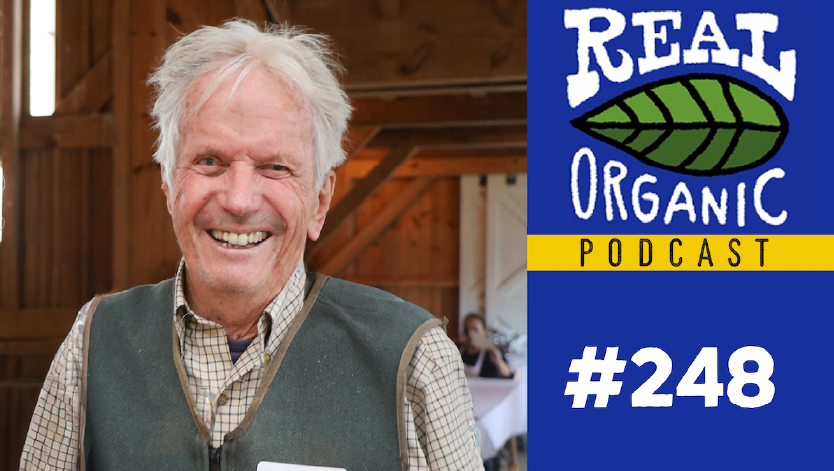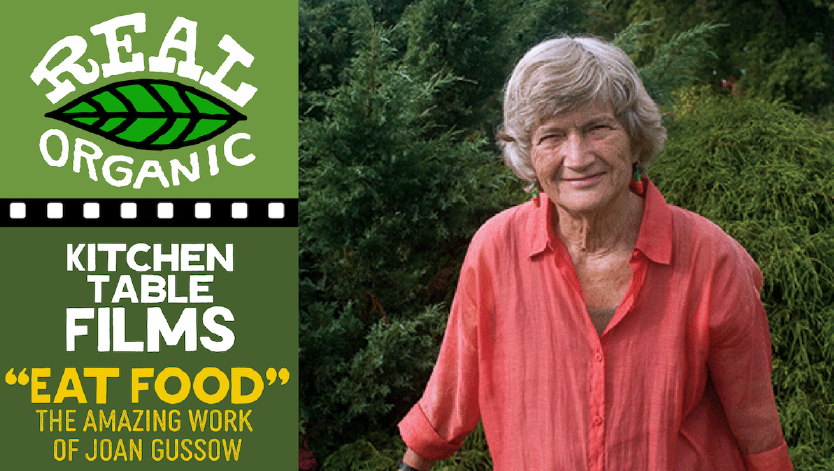Episode #200
Martin Frick: Fixing Food First
Welcome! You can subscribe and download episodes of our show through your favorite podcast app.
You can also subscribe to receive the video version of each episode on our YouTube channel.
Our Martin Frick interview has been edited and condensed for clarity:
Dave Chapman interviews Martin Frick at Long Wind Farm, Summer 2024:
Dave Chapman 0:00
Welcome to The Real Organic Podcast, and today I’ve got the opportunity to talk with Dr Martin Frick and thank you, Martin, you’re in Vermont, and we got together, and it’s an honor and a pleasure. Martin is the director of the World Food Program in the Global office in Germany. Did I get that right?
Martin Frick 0:22
That’s right.
Dave Chapman 0:23
All right. And you know, it caught my attention As I started to do a little research for this conversation. And I found out that in 2020 the World Food Program got the Nobel Peace Prize. So congratulations for that recognition of your work, of what you all are doing. Why did, why did the World Food Program win the Nobel Peace Prize?
Martin Frick 0:47
Well, I mean, first of all, I wasn’t even a member of the World Food Program when it won the Nobel Peace Prize, but I think it’s totally justified, because we’re an organization with about 24,000 people, but working really with around 1000 civil society organizations, and I think it’s fair to say that no matter how dire a situation is, you will find my colleague somewhere in the field trying to alleviate suffering, trying to bring food and really hope to people in the most dire situations around the globe, whatever comes to mind, whatever country you’re thinking of, that is in trouble. My colleagues would be on the ground and trying to address the food security situation.
Dave Chapman 1:33
It seems that almost inevitably, any crisis in a country includes food.
Martin Frick 1:40
Well, food is what happens if everything goes belly up. It basically food insecurity is the result of failure on all levels, and sometimes I’m thinking about food and food systems also the other way around. If you have a situation in which everything is broken. The first thing you need to get right is food. And if you work from a perspective of local food security, many things fall in place almost automatically, because food is the most basic need, and producing food security first and foremost means organizing communities, get people to work together, create that hope, create that spirit, and, you know, build the food security from the ground up.
Dave Chapman 2:30
So there’s a term that you have embraced, food justice. Did I get that right? Is that something that is important to you?
Martin Frick 2:38
Well, there are two terms that are sort of on top of political discussions these days. One is climate justice, and I had a hand in forming climate justice back in 2007 and the other one is food sovereignty, which is something which is on the minds of many civil society people. And I think there’s a relationship between these two terms, because what we have found out over the last years, first covid And then the attack of Russia on Ukraine, is just how vulnerable our food systems globally are, how easily they can be disrupted.
Martin Frick 3:19
And people have come to appreciate their local food production, their homegrown food, as a source of food that is not so vulnerable to things like a global pandemic, when suddenly you know all supply chains are being in jeopardy, and things like, you know, migration, fruit pickers, harvest helpers are not available anymore. So people are thinking more about, where is our food coming from? How do I ensure not only that I have enough food, but that I have healthy food, and that I have a source of food that I can rely on, even if the going gets tough, yeah,
Dave Chapman 4:00
organic farmers in America were very aware of the fact that during covid, people really turned to local food producers, and our business was very good, that it was by hook or by crook. We had to figure out, well, how do we get the food to this person? You know, a lot of people started selling boxes through CSAs afterwards, as things returned to normal, in my mind, a lot of people turned back away from a local food producer to the supermarket system. You have any thoughts about that?
Martin Frick 4:38
Well, I mean, it’s much dictated by prices, and any normal family just needs to make ends meet. So price is a prime consideration, and that is one of the big wrongs of our global food system. And you know, I had a hand in the UN Food System summit that happened in 2020, On, but really had a long preparation process that I think set an example for inclusivity, because we brought in five action tracks, more than 500 global experts together, but we also exported that model to more than 160 national level dialogs where people spoke about their food systems. And one of the basic findings of that is that we speak about and we enjoy cheap food, but if you look close, cheap food is not cheap at all. It’s just cheap because you externalize all the prices, all the costs that come with cheap food.
Martin Frick 5:42
Think about the number of people who are malnourished. And I’m not only talking about hunger. Hunger is, of course, a massive problem, but also obesity, non communicative diseases, diabetes, heart diseases, all of these costs that are not only human, human individual suffering, but also producing costs for society, are being put outside the bracket. So you don’t see that if you look at the cheap food, but you don’t see the social cost of it. You don’t see the environmental cost of it. You don’t see the health costs of it. And one of the things I think we need to get right is to understand how vital food and food as a system is for human health and for planetary health, and that is still disjointed.
Dave Chapman 6:35
So Martin, I have enjoyed talking with you, and I’m sure I will continue to you are working on a, what I would say, a very realistic level, and trying to see the systems, trying to step back and say, Well, we are in these systems. I’m curious for, as you say, somebody who is trying to pay their mortgage and and feed their family, sometimes they they feel they can’t afford to step back and look at these externalized costs. They have to go to the store and stretch their dollars. I’m just curious, do you think that this notion, which is very real, these expenses, are real, somebody is going to pay the price, as well as in human suffering and lack of health? But do you think it’s going to be possible to bring this concern and care to a very broad population.
Martin Frick 7:29
I think it is. And let me make two examples, when we as a society bear the costs, it’s still on the families. It is on the tax burden. It’s public spending that are addressing these wrongs. But let me come maybe for a second to my work with the World Food Program. By definition, we are working for the most disenfranchised, for the poorest communities on this planet. And one of the major things that are trying that is driving global food insecurity, which is at a record high, really, is prices. It’s inflation, it’s in countries. It’s loss of value of local currency compared to the US dollar, and it’s also high prices on global markets. So what we advocate for and what we do is, let’s say if we have a school feeding program somewhere in an African village, we encourage people to grow their own food, to have a community garden, to go into food production themselves.
Martin Frick 8:30
Because, you know, if you have your homegrown vegetables, you don’t care about inflation, they don’t cost you. I wouldn’t say nothing, but next to nothing in inputs, and you can harvest yourself, and you can become more independent. There are many levers we can work on. One of the big levers in rich countries, obviously, is food waste. In rich countries, we are typically wasting close to 40% of the food that we are buying. So if I’m buying three apples and I throw away one because it turned bad, there’s no benefit in it for me. There’s no benefit in it for anyone else. So you know, our grandparents knew that, and they had all sorts of recipes and things they could do to save food. You know, you take your dry bread and you turn that into French toast, you just make sure that you lose as little as possible. So very simple way to save a bit on food without compromising on the quality.
Dave Chapman 9:31
Yeah, or they feed it to the pig or the chicken.
Martin Frick 9:35
That was the old way to recycle it when all the potato peel went to the pigs, and in winter, when fresh produce was difficult to get, you would slaughter the pig and get the meat from that pig. But our situation is that most people don’t live on the ground. They live on cities. They are dependent on the shops. But still, you know, there’s a movement going on about local gardening, about P. Producing their own compost. About people being more mindful to reduce food waste. And I think you know, one of the happiest ways to reduce food waste is not to dine alone, but to cook with a couple of people, to invite neighbors over. It’s a simple thing. The more people you cook for, the cheaper it gets per person,
Dave Chapman 10:23
beautiful. Let’s talk about cheapness of food and expensiveness. You said that in Germany, 3% of a family’s income goes to food. Did I get that right?
Martin Frick 10:36
It’s more now it was 7% we are now at about 10% 10% but it’s still a fraction of what families would spend in a developing country. For example, we have countries where families spend for staple food, 60, 70% of the family income and above. And if you have that situation a spike in grain prices, for example, is just pushing a family over the edge. That is the difference between barely making it and really sliding off to poverty.
Dave Chapman 11:11
Is that because the cost of the food is greater there, or because their income is lower,
Martin Frick 11:17
it’s a combination of both, and it has also to do with import dependency on many of the countries. You know, for a long time, we basically recommended to developing countries to export what they are best at and where they get good prices, and that often is commodities that we enjoy, cotton, coffee, cacao and not too much focus on the local food production, because it can be imported cheaper from other countries. But that often is not working anymore, because the export prices are low, they are getting little money for their commodities, while at the same time, the cost for staple food have really been picking up since covid since the invasion of Ukraine, we are basically at a solid 20% higher prices that we had before it.
Martin Frick 12:07
And at the same time, covid costed tremendous amounts of money, and so many African countries went deeply into debt. Now, if you’re deeply indebted, and you know every homeowner knows that over the last years, the interest rates were coming up, and so countries are struggling to really pay for their debts, and that turns into inflation in these countries. So if you’re a doctor or nurse or a teacher at somebody in public service, your money is not buying you the amount of food that it did before. I have a drastic example from Lebanon. For example, the same price that would buy you two bottles of vegetable oil in 2019 the same amount of local currency now buys you a teaspoon full of vegetable oil, and you’re not making more money. So how on earth are you going to make ends meet? I Smead,
Dave Chapman 13:05
right? So I’m trying to decide. There’s so many places to go here. One is one of the people who will be speaking our conference this fall, is Tim Wise. I don’t know if you’re aware of Tim’s work. He wrote a book called eating tomorrow, and it is a partially a deep investigation into Agra in Africa, the Green Revolution being exported there by the Gates Foundation. And he felt that it was not leading to better life for the people that it was meant to serve. It was, it was leading to consolidation of ownership of land and greater capitalization of that agriculture, really for an export agriculture, not for providing food for the community. Do you think that? Do you see examples in which actually it’s very helpful to have that Green Revolution in Africa.
Martin Frick 14:06
Well, it very much depends. You know, large parts of African agriculture that are more mechanized are basically export oriented. I would say that the lion share of, you know, fertilizer, for example, being used in Africa is not used for African food production. One of the things that I found staggering is that 80% of what is really being consumed in food in Africa is actually produced by smallholder farmers and smallholders in Africa, in American terms, or in European terms, are smallest total farmers. They have patches of land which are smaller than a basketball court, if you so wish, and still, they are able to feed 80% of the population.
Martin Frick 14:55
And I think what that points to is something that is rarely spoken. About, and I call it one of the tacit assumptions that are dominating our discussions around food systems. You know, tacit assumptions. We will be 10 billion people soon. We need to increase production in order to feed 10 billion people. Well, wrong. We have enough food for even 10 billion people. It’s a question of distribution. It’s a question of reducing food waste. It’s a question of our diets. And another assumption, which is not discussed, but it’s somewhere there, is that good agriculture is as little labor intensive as possible, because our idea of agriculture is, you know, one person on an automatic harvester doing the work that has been done by 200 people 100 years ago. Now, if you look at some of the poorest countries of this world, they have population growth that’s staggering. Niger, for example, is having three and a half percent and more population growth per year. So how do you employ all of these young people?
Martin Frick 16:07
And then at the other way, there is a possibility for a very diverse agroecological model, in which on a small farm you would have 10, 1215, varieties, and that’s extremely productive, but it is labor intensive, and so I’m trying to keep my mind around, how do we can have diverse and biodiverse agriculture that can afford that level of labor intensity, and to my View, it’s only possible if we honor those farmers for actually delivering ecosystem services on the global scale. And I would very much hope that you know in the international climate talks, in the understanding that some industries are just emitting more carbon than you know is good for the planet that they should be paying for those who are building soils, who are bringing biodiversity back, and not only have them being dependent on selling the produce that they are producing, although going into biointensive agriculture will increase the yields and will provide livelihoods for people.
Martin Frick 17:21
So this is where the very local level actually needs to connect in a way with the global level in order to support these efforts. You know, we know from climate science that unless we do something on the ground really quickly, we will not be able to keep climate change and check, even if we stop polluting today, the next 100 years, we will still see global warming. So what we need to do is to cool the planet, and adapted agriculture can do exactly that. So people are not only building their own future, they are actually providing a service for all of humanity, and somehow that needs to be put in the equation.
Dave Chapman 18:06
You have said that the democracy, the Western countries, America and the EU, which pay a smaller percentage of our income, a much smaller percentage of our income for food, are also the countries that support the worst agriculture, the one that is most tending towards large confinement operations of animal with terrible conditions, the ones that actually are leading to climate change. How do you make sense of that? Why is that? Why aren’t we the people who are most able to say, let’s make sure that we have a good agriculture that will sustain the world we want to live in. Well,
Martin Frick 18:48
I mean, I’m obviously European. If you think back to the end of the Second World War, there was widespread famine in Europe. That was one of the reasons why the first UN organization that was founded, even before the UN itself was founded, was the Food and Agriculture Organization, and in that way, our industrial agriculture system have been fantastically successful. There is no hunger in Europe. There is no hunger in the United States. There are pockets where disenfranchised parts of the population struggle to afford food, but there is no shortage of food, so that system has worked really, really well.
Martin Frick 19:28
But what we understand over the last years is just how big a contributor our food systems are to the environmental crises we are facing. You know, agriculture is the biggest killer of biodiversity. It’s the biggest user of fresh water, and if you take food as a system, food is the biggest contributor to climate change. We are used by the climate negotiations over the last What is it now, 29 years, to look into the energy sector, to look into air trans. Transportation and these things, and totally overlook how important and significant the impact of agriculture and everything that comes with it, packaging, transportation, refrigeration, all of that is on our planet. And we understand now what we didn’t understand maybe 30, 40, years ago, that we need to look into that, because it’s of vital importance for our civilization, and that’s changing the perspective.
Martin Frick 20:29
And I think we need to get out a little bit of the panic mode, what I called earlier tacit assumption that we need to produce more, more, more, no matter what, but we need to produce better. We need to produce in a way that is nature positive, that’s building up depleted nature capital. And you know, we need to look into things like restoring degraded land, which is a problem on an incredibly scale. We are losing three times the size of Switzerland every single year to land degradation. We cannot afford that anymore, so we need to get our minds around. What can we do so that farmers are empowered not only to scratch the last bit of productivity out of a piece of land, but to really bring it back into arable land, into agricultural use.
Dave Chapman 21:24
Do you have a vision of how we might accomplish that or or move in that direction? Realistically, I’m I’m thinking of a comment that Michael Pollan made, and it kind of haunts me when I asked him if things had gotten better since he wrote Omnivore’s Dilemma 15 years earlier, and he said the conversation has gotten much better. People are much more aware and knowledgeable and thinking about this, but the actual system has gotten worse. Yeah,
Martin Frick 21:57
I’m a lawyer by training and a political scientist, and what I see is actually a failure of the international system, which is no conspiracy theory. There is no evil doing here. It’s just that the system that was actually conceived in 1648, the Peace of Westphalia, comes to its limit. What I mean is that is what we have learned. Our system of international problem solving is based of sovereign nation states. We now have close to 200 sovereign nation states coming together in something like the UN climate negotiations and trying to find the consensus. Now this is twice impossible, because a if you look at something like agriculture, this looks so very different in New England than it does in Burkina Faso. It’s both called agriculture, but it’s fundamentally different.
Martin Frick 22:54
So how can you in a conference room fit a formula that find a formula that fits anyone on the planet. Mission Impossible. And then, on the other hand, of course, in these negotiations, there are countries present whose business model is to sell fossil fuels, and so they are not particularly eager to find an agreement tomorrow. And yet, everything climate comes to this conferences of parties that every year produce the same disappointing results. While we have seen that over the last 29 years, emissions have been soaring, and it’s not only that the emissions would be reduced, it actually is the case that we still add more emissions every single year to what is already at the atmosphere. So somehow we need to find a model by which local action, and you know, famously, all politics, are local, but local action is created in a global framework, in a global, I would say environment of shared values, really, and getting people to actually act on their climate concern.
Martin Frick 24:10
You know, there are polls, which I find fascinating, that in this country, two thirds of the people actually are very afraid of climate change, and they want climate action to happen. So why is it not happening? Because if you look closer, two thirds of that majority actually believe that they are the only ones who are being concerned, and they are afraid of being ridiculed or singled out if they speak to their belief. So we need to organize people and say, you know, no matter what your constituency is, whether you’re a farmer, whether you’re a worker, whether you’re working in an office, you can be assured that the majority of people around you actually understand climate change and they want action to be taken. So we need to get that narrative and.
Martin Frick 25:00
That understanding out of the hands of big media, of big public relation companies, and start talking about these issues in our communities, as I believe that there is not a single community where you couldn’t do your tiny little bit to make the situation better, and by doing so also become visible and be noticed by your Congresswoman, by your Senator, whoever is responsible for your constituency. That would be a way forward in which we can move and we don’t wait for the classic model that the UN agrees on something and then it goes down into national legislation, and that finally creates reality on the ground. When we can create the reality on the ground right away. Yes,
Dave Chapman 25:49
I liked, I liked your comments that I that I heard you say, talking about the action tracks that might be taken and and the action plan, and it involved people talking together, a lot, yeah, and talking locally, but then also connecting on a larger scale, it’s, it’s a fair amount of commitment for people to to make those connections, but at the same time, it’s also about The most rewarding thing that somebody can do,
Martin Frick 26:22
it actually is and you know, there’s this old common wisdom that nothing unites you like a common enemy. In my view. You know, climate change has become such a divisive issue, and people are yelling at each other with a megaphone, but if you think about it, it should be the most uniting thing for humanity. It’s sort of as if the two of us would play chess. You know you want to win, I want to win, but the moment the chess board catches fire, we would both be united in trampling out the fire.
Martin Frick 26:56
And once we did that, we can happily continue to fight each other, and that is what I want to transport to people to say, you know, put your differences aside, but have your discussions, not on whether or whether or not climate change is happening, but about the best way to get out of it. And I wouldn’t know the solution. Look at transport. You know, is it electric cars? Is it hydrogen? I don’t know. Is it methanol? Is it is or no? Is it better public transport? I’m agnostic, but I would love to have people to have these discussions, instead of yelling at each other whether or whether or not, climate is real. It is pretty real, as everyone who is observing, you know, the years will testify to, yeah,
Dave Chapman 27:43
yeah, yeah. Well, it’s certainly there’s been a transformation in the last 10 years in America with the farm community, which, 10 years ago, they were very many. Many American farmers were like, this isn’t real. And now I don’t think there are many American farmers who don’t believe it’s real because it’s impacting their farms Absolutely. Yeah. So that we’ve gotten past that one, yeah. Now the question is, what do we do and in things that are obviously in our common interest?
Martin Frick 28:15
Yeah, and here, food is just our best starting point. You know your next shopping is your piece of climate action. It’s the immediate discussion. It’s the immediate decision. It’s basically your daily ballot box is starts with going shopping and buy the produce you want to use, and you think about what you’re doing to your body, what you are doing to planetary health. You maybe think about how to reduce food waste, how to buy quantities that you are actually consuming. And again, you might want to invite your neighbors to share a meal. There is nothing more human than sharing your meal with others, right? And I think there is a thin line in which people, for many years, argued that climate change is not real, and now they get it, and they tilt into desperation. Now it’s too late. There is nothing we can do. We are all doomed.
Martin Frick 29:14
And even, you know, with a connotation of Oh, mankind is doomed because we don’t deserve better. I don’t think that’s, you know, any helpful. I don’t think we are doomed. I think we can take action, and we have millions of opportunities, and there are so many good people out there who, you know, found a little trick to harvest the rainwater that’s running down their roof, or to install solar panels, or, you know, organize a children’s summer camp so we don’t need to travel 1000s of miles to have some fun when we can go swimming in the river over here, you know, all that kind of things, I think. And I spoke before about tacit assumptions, I think one of the big. Tacit assumptions that we need to challenge is that having and enjoying all these highly carbon intensive benefits yields to a better life. I think ultimately what we need to do is to lean back and say, how do we want to live?
Martin Frick 30:16
You know, and then you factor in things like having time for your old parents, spending time with your children, eating food that actually makes you healthy, not sick, breathing air that you can enjoy. Being in a city where you can sit outside and have a conversation in a Street Cafe and you don’t need to shout because it’s so loud because of the traffic these things. You know, it’s not that. And I think there was a mistake in the environmental movement that for such a long time we told people what not to do, but we should be speaking about what you can gain, how much more fun your life could be, how much better it could be, how much how we could be more human. How we could have, you know, not cities where 60% of the tenants are singles, eating some ready made meal alone at the table and being unhappy. That’s not the good life.
Dave Chapman 31:20
Martin, in in your experience in the EU Do you feel that that things are at a different stage with general population, that this is much more of more people are getting it? I’m thinking partly of the of the Farm to Fork initiative, which was a big deal, in my opinion, that the European Parliament made a commitment, it wasn’t a law, but a commitment, to try and bring organic agriculture up to 25% of the farmland and to bring down the chemical inputs by 50% now in America, that would be a profoundly radical thing, yeah.
Martin Frick 32:04
Well, it was radical, and it made me very hopeful. Unfortunately, it’s an uphill battle, and all of that you know, policy content of the green of the farm to fork, and the green New Deal is sliding down again. And there was a moment when both, as I said, covid hit the global food systems, and then the Russian attack on Ukraine, where there was a panic mode, like, we are running out of food now we need to produce no matter what. And that, I think, was exploited by interested sites to say, well, you know, we cannot afford to have 1% of our land not being used, which I would always challenge, because it is being used for pollinators, for biodiversity, all of that.
Martin Frick 32:55
And there were voices saying, you know, let’s bring back that into agricultural use. Let’s put all the land under the plow that we possibly can. It’s not true. I mean, I was checking a study that if the European Union had done that, the effect on the prices of wheat would have been a fraction of 1% it doesn’t really make sense, but it is an uphill battle. And it’s also in the European Union, something that constantly needs to defend it against that argument of during increasing the prices of our food, families are suffering.
Martin Frick 33:33
You know, in the European Union, we have seen inflation up to seven 8% so, you know, families struggle as much as they do in other places in the world, and it’s difficult in these circumstances because people want to default to the known, and then it’s hard to explain that what you have seen in terms of inflation is not a function of growing organic it’s actually other macroeconomic conditions. So in short, it is remaining a challenge. It’s not that the EU has squared the circle. They have done a bold step, but then they tripled back. And now, you know, it takes a lot of initiative to revamp that effort and to bring it on. But you know, you said that earlier, the conversation has gotten better. People are more educated. They’re asking the right questions.
Dave Chapman 34:26
Do you think that the pushback is organized by companies that basically make a great deal of money off the old way, and they don’t want to see that change because that’s their profit model?
Martin Frick 34:40
Well, let me answer diplomatically, yes. I would be surprised if it wouldn’t be the case. Yeah,
Dave Chapman 34:45
yeah. Let’s talk for a minute. There’s a big one I want to go to, but let’s talk for a minute about the food system Summit. That’s something that you were very instrumental in organizing. And I think those the. Food and systems and summit are all significant words in that title. So let’s talk about that first, why is food the important part of this conversation, and why are systems The important part of this conversation,
Martin Frick 35:14
right? I think it was a visionary thing of the Secretary General of the UN to call for a food system Summit. And that word alone, I think I spent months of my life explaining why a food system Summit, and I think the whole term is basically recognizing the central societal importance of food, which goes way beyond of just an inverted comer feeding people, but it recognizes, for example, that food is the biggest employer on this planet, and that food is also the strongest indicator for social inequality. If you look at malnourished country, it is an function of income, the better people earn, the better nourished they are. People at the bottom of the pyramid are often obese, for example, because they just live on carbohydrates and they cannot afford fresh produce.
Martin Frick 36:14
So there’s the social perspective on it. There’s a huge risk management perspective of it. You know, food is a system that runs silently and you don’t think much about it if you go to your supermarket and do your shopping, but we have seen empty shelves. We have seen that in Europe when covid started, and suddenly you come to the realization that we are walking on thin ice here. So the food system summit also had an action track on resilience, on managing risk, and needless to say, that food price fluctuations can also trigger political instability. The Romans knew that the bread price is a political price, and you need to get that right. There is an enormous environmental footprint we spoke already about this one which relates to food. There is hunger in the world still chronically. 800 million people give or take. 20 million chronically food insecure. More than 300 million people in need of humanitarian assistance because they don’t know where their next meal is coming from. It’s just unacceptable.
Martin Frick 37:22
How can we as a human family still accept that there is hunger out there and then there’s whole nutrition perspective? There’s so much work that was done over the last decades about the central significance of what we eat for our human health, and we have staggering health costs in industrialized countries that are directly related to our food consumption patterns. So that food system Summit, for the first time, made an effort to bring all of this together. And I think the biggest success is that people are now using the term food systems, which makes you think in more systems terms than if you just speak about food. And then the other thing, and for me, these are like two sides of the coin, is you need for an educated conversation around food. You need representation of all walks of societies. You need your single mothers. You need your doctors. You need the farmers. First and foremost, you need the farmers who are so often not being heard. But you also need the educators. You need the young people. You need the climate activists. Because it’s an all of society issue it’s difficult to address. It is very transactional. So many people are being involved, but it is also a very powerful pressure point for positive societal change.
Dave Chapman 38:58
At one of our rallies, Shelly Pingree, who’s a wonderful Congresswoman, came and spoke, and she pointed out that more food is spent in Washington DC lobbying, more money is spent in lobbying, lobbying for food, than in lobbying for the defense industry. That’s amazing. I can’t imagine that. Yeah, yeah, there’s so much tied up there, and it might actually be more important than defense, in terms of defense, in terms of having a stable and safe, safe place to live.
Martin Frick 39:30
I mean, this is pretty much what I’m telling European lawmakers. You mentioned that I’m leading the Berlin office of the World Food Program. That is because Germany is after the US the second biggest donor. So I’m in the sense the beggar in chief, walking around and convincing German policymakers why they should invest into food security in places you know, like Burkina Faso, Niger Mali. And one of the reasons, obviously, is also political. Ability you cannot expect your neighboring continent to remain stable and quiet when people are running out of food. It’s driving civil unrest. It’s driving political destabilization, and it is creating an environment which actually favors radical groups which you don’t want. So I totally agree with what your Congresswoman said in this respect.
Dave Chapman 40:25
Well, of course, they named the Green Revolution the green revolution because it was intended as a counter to the Red Revolution. It was intended as a way of selling Western democracy as an answer, which I think it sometimes succeed at and sometimes greatly failed at. Let’s talk about this idea of philanthropy versus reform, and philanthropy meaning I’m trying to think of people are hungry, and we need to get food there to feed them and reform being, I would think, trying to change the system so they’re not hungry. Yeah, would you, would you agree with that as, uh, oh, I mean, as a way of dividing, you know, seeing this as couple choices that we have. Well,
Martin Frick 41:16
the World Food Program is a bit over 60 years now, and when we were founded, that recognition already led to a double mandate. It’s called saving lives. Changing Lives and saving lives is the humanitarian side of you know what people see of trucks going into countries that have food insecurity and dressing the situation? But changing lives is really about creating the condition so that people can better feed themselves and be more reliable. And what I have seen over the last years is the numbers of people who are in need of humanitarian assistance exploding, and no philanthropy money in the world will be able to address that need. So for me, it’s a no brainer that we have to invest into change on the ground to ensure that fewer people are depending on humanitarian assistance. Assistance, quite simply, because we don’t have the money to address all of this need. And, you know, having foreign production being brought in to feed people on the ground is not a sustainable model. Why?
Dave Chapman 42:25
Why do you believe that that food insecurity has been expanding so radically? What in the situation is making that problem get worse instead of better?
Martin Frick 42:37
I think it’s the three C’s, as I want to call them, and number 1c is still conflict. We have twice the number of life conflicts today than we had 10 years ago. And we have many protracted conflicts that are still not resolved. Conflict is still the biggest driver of hunger. I think we estimate more than 60% of the real hunger situations on this planet is because of fighting. But then increasingly, climate change is becoming a more important factor of food insecurity. You see how extreme weather, how flooding, how extended droughts, how changes, even subtle changes, in nighttime temperatures, affecting not only the yield of crops, but also the nutritionist value of crops that’s coming online stronger and stronger and its costs more and more people simply cannot afford a diet, even well, Even a simple diet, not even a healthy diet, because of the factors that I have mentioned.
Martin Frick 43:45
And we are still struggling from covid, although the pandemic is over, but the financial aftermath is not. And you see that in terms of inflation staggering, we have 65 countries in the world where food inflation is at 10% and higher, and we have even places in the world where food has gone up by 1,000% so anyone who is not earning in foreign currency, but in local currency, basically, is facing an impossible situation. So these are the three main drivers, and I think in all three. C’s diversified local food production. Empowerment of smallholder farmers, particularly women, is essential. It can address all three of these. C’s
Dave Chapman 44:33
Interesting, yeah, it’s so hard for me and most Americans to understand these impacts in other countries. We we live in our little community, we live in our little world, to understand what does covid mean to somebody Far, far away, and how did that change their world in a way that really diminishes the the. Health of their lives. Give
Martin Frick 45:01
you a very simple example, in the United States, as in Europe, in so many restaurants, if you go to the kitchen and you see the people washing the dishes, preparing the food, you will see so many people from foreign countries working there. It’s sort of the entry level labor market. If you come to a foreign country, you don’t speak the education. You don’t have, you know, formal education, maybe you don’t even have papers. Where do you end? Somewhere in the food sector. Now, when covid hit, what was the first thing that happened? All the restaurants closed down.
Martin Frick 45:37
You cannot go to the local office and say, I want my unemployment money, because you are not even registered. And foreign countries, you know, poor foreign countries very often live on remittances, on the money that people send home from the little they are making in the rich countries where they are working. And that stopped overnight, and then all the costs related with covid, you know, looking after people, rolling out health plans, closing down public spaces, all that costed an enormous amount of money that, for many places in the world, could only be financed by additional debts, which now cost heavy as The interest rates went up.
Dave Chapman 46:18
Yeah. Okay, that’s helpful. You said something earlier, and it was about, I don’t know if I get the words right, that the industrial food system seeks simplicity or is simple. And I don’t know if those were your words and and we were talking about an organic, a deep biological system is seeking, yeah, complexity. So could you, could you speak to that for a minute? Yeah? Well,
Martin Frick 46:51
I think you know, in what we now call traditional farming, well, it’s not traditional at all. You have a problem, you take a chemical which provides the solution. Your soil is not rich enough, you put fertilizer on it. That’s a simple solution, and it doesn’t need a high level of education. Now, what we see in organic agriculture is you really need to profoundly understand the complexities and interdependencies of nature, you know? And spoke to a farmer earlier today, and he said, My job is basically to fail all the time and to learn from that failure and make it a little better. And I think that’s very true. Nature is a very, very complex system. It’s like a Swiss watch, and we try to repair that swish Swiss watch with a big sledgehammer. Now, if you go really deep into nature positive farming, you need to learn a lot. You need to understand a lot. And that’s a challenge.
Martin Frick 47:50
You know, we had in many countries of the world after the Second World War, big programs to support farmers, extension services, Farmer schools, all of that in many countries, they don’t exist anymore, while at the same time, we have farmers in Africa, for example, that are actually migrants or people who were displaced in their own country. They are sitting on a piece of land. They are trying to produce something, but they are not farmers in the sense that they learned from their parents how to farm. So you need to educate people and say, This is your natural system. This is what you can do. This is the amount of rainfall you get. So how do you keep the moisture in the ground? What can you do so that even sparse rainfall is enough to do agriculture. How do you deal with extended trouts? How can you build, for example, an agroforestry system where you mix trees and other products in order to create a functional system. How can you use animals holistic grazing to mimic natural systems and bring up soils and biodiversity that needs a lot of knowledge, and that’s not simple. So education and understanding really is the key to successful organic agriculture. Yes,
Dave Chapman 49:16
before we go to a final place, I want to ask you about the article in Nature, which I assume that you’ve seen, which claims that the world cannot afford to have organic agriculture because it will contribute too much to climate change, because it claimed that the yields were lower per acre, and thus you require more acres, and thus you’re taking acres away from natural ecosystems like forests. Are you? Are you aware of this article? Because it was quoted to me by the head of a department at Dartmouth College, yeah.
Martin Frick 49:50
Well, I mean, it is, I think, a classic example of my tacit assumptions. Because one of the assumption is, if you want to have more air. Area for agricultural production. There’s only one way to cut down forests, and then you calculate the carbon footprint from that. I think it’s entirely wrong, because we get massive, massive amounts of degraded land that could be brought back into agricultural use. That’s one of the things that people don’t look at that, more than half of the world’s soils are moderately to severely degraded. There is a huge productivity opportunity in bringing those soils back to life, which is possible. Another tacit assumption is that the world’s dry lands are not productive, and you would need to invest billions of dollars into irrigation systems to make that land usable. It’s not true.
Martin Frick 50:48
You know, there’s agriculture going on in places that have very little precipitation if you do it in an adapted way. But maybe most significantly is that these assumptions basically take our consumption data and say, Well, this is a given. Is it a given that we have to waste 36% of our food? I don’t think so. Is it a given that about the same number, close to 40% of the food in African countries is also wasted, which you would scratch your head and said, why would that be? People are hungry, and still they’re wasting food. It is because simple food processing is not available. Sometimes it’s as simple as the local road has been washed away and the farmers have no way to go to the market. Leave alone, simple things like cool chains or canning of food, which has become even cheaper and simpler, because you can happily have a decentralized, solar driven cool warehouse somewhere in the middle of nowhere.
Martin Frick 51:53
You don’t need to be connected to the grid. I think that’s really a pointing case why this food system approach is so important that you don’t look at the production and say, today we need 100 and then, you know, in 10 years, we might need 120 and so we need to produce more. If you don’t look at where is actually the productivity going to you know how much agricultural space is going into producing fuel, for example. Is that a sustainable way? Is there a better way of producing mobility for people than that? But that exactly needs that conversation, not in a small expert bubble, but to talk left and right and say so, you know, how can we actually address the situation?
Dave Chapman 52:42
Yeah, excellent. Thank you. So before we close, Martin, I promised everybody that you would be back. Are there last things that you’d like to say? I found you to be courageously optimistic, and I know that you’re dealing with problems that for most people are overwhelming, and I’m sure they’re overwhelming for you too sometimes, but you have come up with strategies that are hopeful, if not optimistic, at least hopeful. And are there last things you’d like to say about, how do we as a troubled species try to come together and move forward? Yeah,
Martin Frick 53:29
well, I think first and foremost, we tend to be negative about ourselves. You know, we brought ourselves as humanity in a mess. Well, we did that before we humans are good in getting ourselves in a mess, but we must not forget that we are actually leading a life that our ancestors could only dream of. And I think if there is one unlimited source of energy, then it’s human ingenuity, and if we would take our mind not in what divides us, but what unites us in that respect, I think we can come up with incredible solutions. You know, I’m here in Vermont now. Over the last two days, I’ve seen so many people doing their ingenious little things that help them living better in harmony with nature, but also, quite simply, creating good lives for themselves and their families.
Martin Frick 54:26
So I believe in that power. I think what’s really needed is to go back to where the trust is, to go back to the local communities, to have the conversations in a way that’s not a political shouting competition, but actually look at each other and say, How can we collectively solve that? And if we come to that, if we understand that the environmental changes that we don’t want, loss of biodiversity, global heating is actually a common enemy, then we can unite around that common enemy and say, well. We can overcome that. And in that sense, I’m optimistic, you know, I mean, we are recording this conversation on a device that fits in a hand. My dad was a radio journalist to do the same interview 50 years ago, he would have brought half a truck full of machinery. So, you know, obviously we are making progress.
Dave Chapman 55:21
Martin Frick, thank you very much for talking today.
Martin Frick 55:25
Thank you for your time. Thank.


